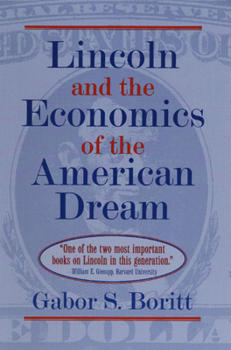Lincoln and the Economics of the American Dream
Select Format
Select Condition 
Book Overview
This unique exploration of Lincoln's economic beliefs shows how they helped shape his view of slavery, his conduct of the war, and most fundamentally his understanding of what the United States was and could become.
Format:Paperback
Language:English
ISBN:0252064453
ISBN13:9780252064456
Release Date:December 1994
Publisher:University of Illinois Press
Length:416 Pages
Weight:0.15 lbs.
Dimensions:0.9" x 6.0" x 9.0"
Customer Reviews
2 ratings
A Lincoln Everyone Needs to Know
Published by Thriftbooks.com User , 24 years ago
The "prime goal" of this marvelous book by Gabor Boritt, Professor of Civil War Studies and director of the Civil War Institute at Gettysburg College, "is the examination of [Lincoln's] economic persuasion, of how it broadly manifested itself in his political life, and how it affected American history." For many readers, a book about Lincoln's "economic persuasion" may seem pedantic, if not trivial, but Boritt demonstrates that Lincoln's economic views were central to his political philosophy. Had Lincoln not been an economic nationalist, he almost certainly never would have risen beyond being an unknown, provincial Illinois politician.As Boritt explains in the preface, Lincoln's "connections with political economy" "may appear to be dreadfully dull to some," but the author cautions that "it is indispensable." Lincoln first came to prominence in rural Illinois in the 1830s as an advocate for "better transportation - `internal improvements,' as Americans called it." As a member of the Illinois House of Representatives, Lincoln "supported the creation of many, though not all, private, river, canal, turnpike, and railroad companies." At the end of the first chapter, Boritt writes that Lincoln's "political activity was inspired, beyond the hope of personal or party gain, by a vision of endless material progress," which became the "American dream."Because Lincoln's origins were humble, he often is portrayed as a champion of the common man, but, as Boritt observes, for Lincoln, "banking was a special interest," and, in 1835, he supported a state bank because, according to Boritt, "the Illinois economy needed banking facilities above all to support internal improvements." By 1837, Lincoln was a member of the [Illinois] House Finance Committee, and, according to Boritt, he "made economics the most substantial part of his campaigning, legislative labors, and private studies outside (and not infrequently inside) his legal work." In an 1837 speech defending the state bank, Boritt writes that Lincoln "was giving voice to the prime element of his developing economic persuasion. The fact was that for the man who would rise, for the nations that would rise, banks were necessary." Boritt's assessment is: "Lincoln's involvement with improvements helped him reach convictions which played a crucial role during his presidency." According to Boritt, "the improvement episode helped make Lincoln a lifelong opponent of the localism and sectionalism that proved so destructive in Illinois." In the mid-1840s, when Lincoln was hoping to be elected to Congress, his "Whiggery was mainly economic oriented," and his acceptance of broad party principles "meant national economic goals." According to Boritt: "Lincoln's thinking...exuded nationalism." In Washington, he "desired large scale federal improvements, federally directed, at federal expense." "But in Congress Lincoln began to shift his attention from specific questions of economics" as a result of the Mexic
Don't just know Lincoln, understand him.
Published by Thriftbooks.com User , 25 years ago
I've read many titles on Lincoln and have come to know the man, his words and his deeds. But now I can say that I understand him. American revisionists have lately found it fashionable and all too easy to knock down our heroes and charge them with crimes from the perspective of the Twentieth Century. Yet, Boritt's insights are a wonderful celebration of a true American hero. And better yet, Boritt makes no apologies for it. Perhaps we needed to wait for this foreign born author to remind us what has been really important about the USA all along. Wrap yourself in the red, white and blue and feel patriotic again. Oh, and by the way, don't let the title scare you. The book is quite an easy read.





